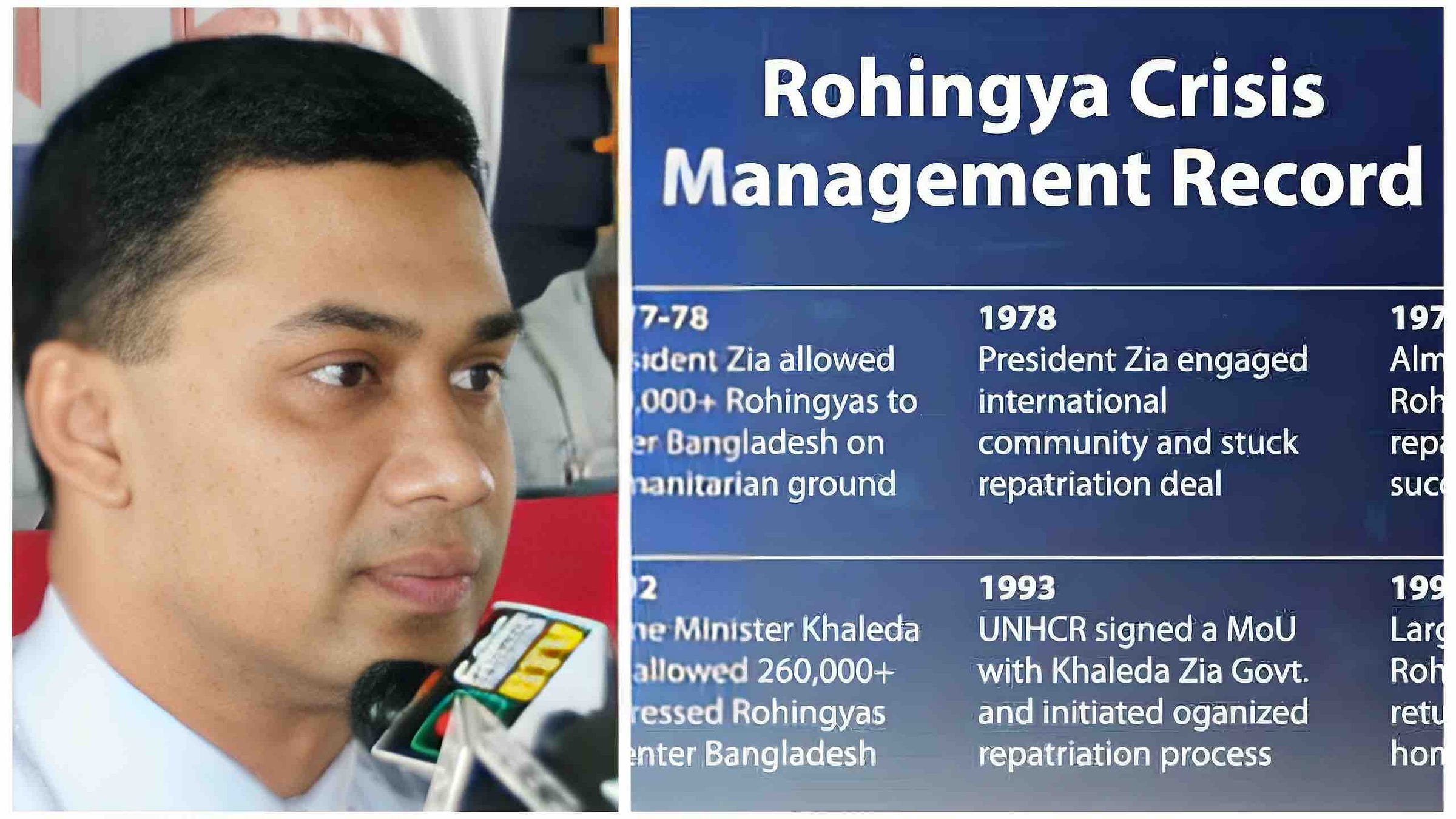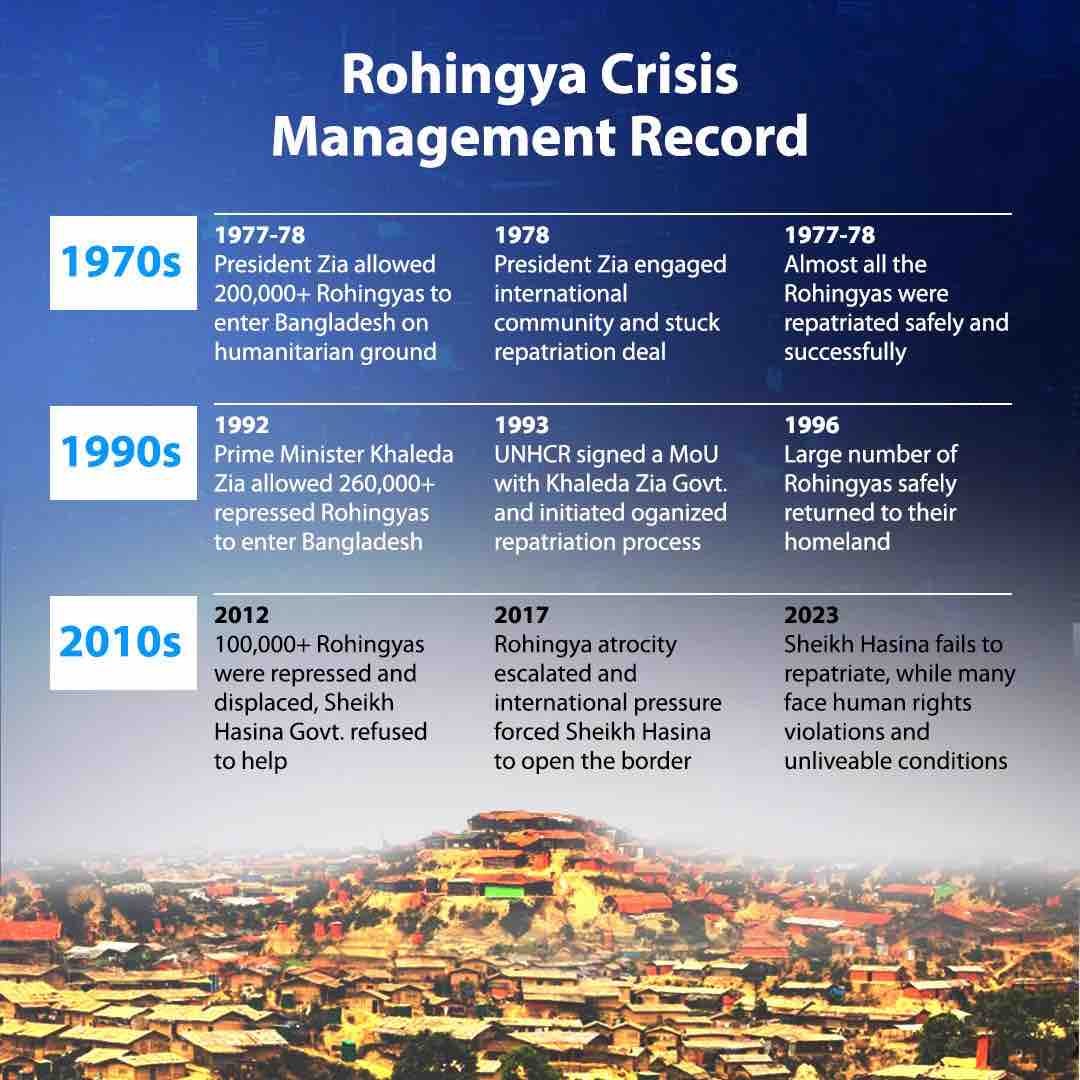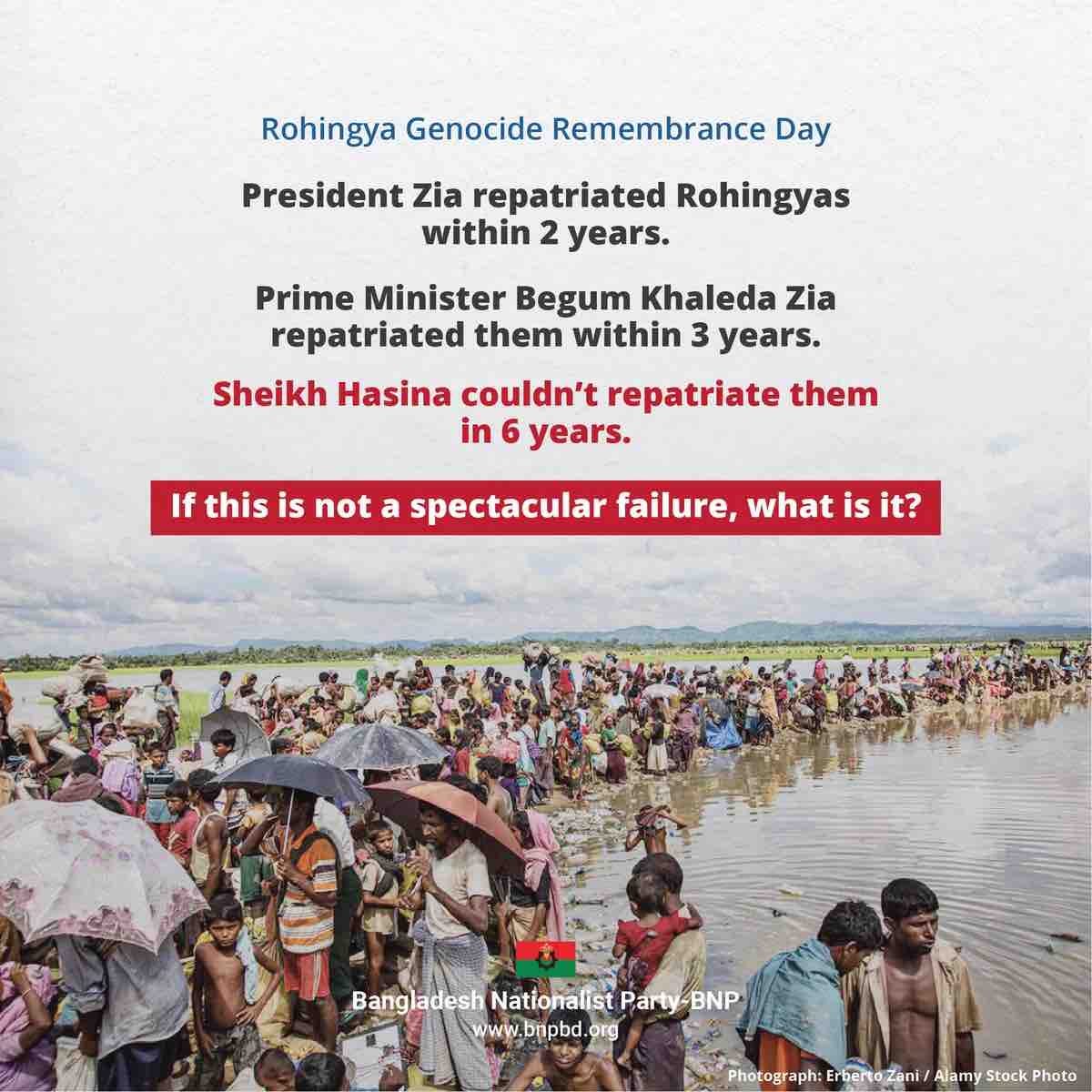Bangladesh's Opposition and the Rohingya crisis
Turning Refugees into Political Pawns

On the 6th anniversary of the 2017 Rohingya exodus, a grave crisis that saw hundreds of thousands of Rohingya Muslims flee Myanmar to seek refuge in Bangladesh, the Bangladesh Nationalist Party (BNP) and its heir-apparent, Tarique Rahman, took to X, formerly known as Twitter, to make some politically-charged remarks. While the ostensible aim was to draw attention to the plight of the refugees, the tweets amount to nothing less than historical distortion, revisionism, and political opportunism. With parliamentary elections due by January 2024, Bangladesh's tumultuous domestic politics is unnecessarily adding another layer of complexity to the Rohingya situation.
Revisiting the Tweets
The tweet from the BNP read:
"As today marks 6 years since the #Rohingya genocide, a textbook example of ethnic cleansing, we want to ask why #Bangladesh dictator #SheikhHasina & @albd1971 couldn't repatriate them in 6 years. Our answer is absence of democracy, accountability & popular mandate, are the reasons."
Tarique Rahman added:
"On the Sixth Genocide Remembrance Day, we stand together with the #Rohingya refugees in sympathy and solidarity. Let us strive for a world where universal human rights are respected, and such atrocities never happen again."
While both tweets call out the Awami League government and its leader, Sheikh Hasina, for failing to repatriate the Rohingya refugees, they offer a sanitised rendition of the BNP's own track record. Both tweets laud the BNP government for having repatriated Rohingyas during its tenure, but what they fail to mention is that those repatriations were anything but safe. Many were forced back into Myanmar through coercion, physical and sexual assault, and starvation by the Bangladesh authorities (look out for my upcoming article on the repatriation process of 1978). And. of course those repatriations proved to be unsustainable and indeed contributed to the cycle of violence against the Rohingya community. That cycle we now know as genocide.

In an attempt to bolster his narrative, Tarique Rahman also posted a table contrasting the records of the BNP and the Awami League regarding the Rohingya crisis. The tabular presentation lays out a chronology of events dating back to 1977, depicting BNP's actions as proactive and effective. What's egregiously missing, however, are the grim details that accompanied those historical repatriations. By glossing over the coercion, physical and sexual assault, and starvation by the Bangladesh authorities (yes I need to repeat those words) that were part and parcel of these so-called "successful" repatriations, Rahman appears to be banking on the public's ignorance or forgetfulness of history. Far from commendable, the actions of the past administrations were fraught with human rights violations and contributed to the ongoing suffering of the Rohingya community. To reiterate, this ongoing suffering is what we now rightly term as genocide.
Bizarrely, Tarique Rahman tagged a series of humanitarian organisations, including Human Rights Watch, Amnesty International, Refugees International and the United Nations High Commissioner for Refugees (UNHCR). Is this a calculated attempt to mislead his followers into believing he is aligned with these organisations' human rights stances? It's a baffling move, given that these very organisations have been vocal against any form of forced repatriation of Rohingyas—a practice that was actually carried out under Rahman's own party! However it is worth noting that while UNHCR has generally opposed forced repatriations, it too was implicated in the problematic returns mentioned by Rahman.

The graphic posted by the Bangladesh Nationalist Party (see above) offers a misleading and overly simplistic portrayal of the Rohingya repatriation efforts carried out by different regimes. By focusing merely on timelines, the graphic omits crucial contextual information, glosses over the often inhumane conditions under which these repatriations occurred, and presents an ahistorical account that ignores the evolving complexities of the crisis. This way of looking at things misses the many complicated issues that make the Rohingya crisis more than just a task for the government to check off its list.
The tweets from the Bangladesh Nationalist Party and Tarique Rahman serve as a disquieting indicator that the Rohingya have become mere pawns in Bangladesh's political chess game. Caught between the proverbial rock and a hard place, they face dire circumstances in Myanmar and are now ensnared in a dangerous and bewildering political climate in Bangladesh.
Recognising the potential for the Rohingya issue to be weaponised against them, the Awami League, currently in power, has recently ramped up efforts to initiate the repatriation process. Foreign Secretary Masud Bin Momen announced plans to begin the repatriation of around 1,000 Rohingyas to Myanmar this year, citing confidence-building measures and ongoing discussions with Myanmar authorities. However, as we already know, these efforts have been marred by various inducements, misleading statements, and even coercive tactics.
In refugee camps, ongoing efforts involving subterfuge are being employed to convince refugees to participate in repatriation initiatives. The National Security Intelligence (NSI) of Bangladesh has orchestrated the "Let's Go Home" campaign, aimed at rallying refugees for return to Myanmar. However, these efforts have raised concerns due to reports of threats, coercion, and offers of monetary rewards to influence refugee decisions. This campaign simplifies messaging, focusing solely on repatriation and omitting discussions about rights and safety. Additionally, a proxy organisation called Forcibly Displaced Myanmar National Representative Committee (FDMN), created by the Refugee Relief and Repatriation Commissioner (RRRC), plays a role in these efforts.
Adding to the troubling landscape, the government has continued to stigmatise the Rohingya. On the 6th anniversary of the crisis, crime statistics within the refugee camps were prominently publicised, and Refugee Relief and Repatriation Commissioner (RRRC) Mohammed Mizanur Rahman specifically attributed the rise in crime rates to delays in repatriation. He also claimed that the Rohingya are 'reluctant to cooperate with law enforcers' due to their 'stateless mindset.' Such sweeping generalisations, which overlook systemic issues, are both irresponsible and dangerous.
For goodness sake…
The Rohingya crisis is a lot more than a footnote in Bangladesh's political skirmishes; it's a humanitarian disaster that demands urgent and ethical intervention from the global community. Their plight cannot be trivialised like a political football, especially when lives are at stake. Now with the elections coming up, there are very real human costs embedded in this kind of political posturing.
Will the two parties ever see the Rohingya crisis for what it is—a litmus test for human rights and ethical responsibility? Don't hold your breath! But they should realise that rehashing failed approaches won't solve anything. (And I suspect they do!) Now is the time for both parties to abandon dangerous policy stunts like forced or unsafe repatriation, as they only serve to worsen this ongoing human tragedy.
